






The legacy of Mary Sutherland
The careers of the class of 1985 –driving positive change for forests and forestry
Celebrating student successes awards
World class research highlights



 Dr James Walmsley and Professor John Healey
Dr James Walmsley and Professor John Healey
Forestry is one of Bangor University’s oldest subject areas and will celebrate its 120th anniversary this year, alongside a series of celebrations marking the 140th anniversary of the foundation of the University. I very much hope our alumni will celebrate with us. In recognition of this special year, I’m delighted to welcome you to the 2024 Forestry@Bangor newsletter, specifically written with our alumni in mind.
One standout item is a summary of the careers of the ‘class of 1985’. Their achievements are outstanding and, yet they provide our current students with the inspiration to believe that they, too, can and will make a real and positive difference to the world. At our graduation ceremony in December 2023, I was delighted to award an honorary doctorate to Trefor Owen, a member of our class of 1985.
In this newsletter, you will also find out about new members of forestry staff, the launch of a new degree programme, student awards and achievements, exciting and cutting-edge research, the funding of a range of student projects using generous donations from our alumni, and much more.
I believe this newsletter will be a source of optimism and enjoyment for our alumni and stakeholders in addition to it being an inspiration to prospective and current students I hope it will encourage those who might be considering studying, working for or supporting forestry at Bangor University to get in touch. As always, we are indebted to alumni for their continuing valuable support.
Yours,
Professor Edmund Burke Vice Chancellor, Bangor University 5th March 2024

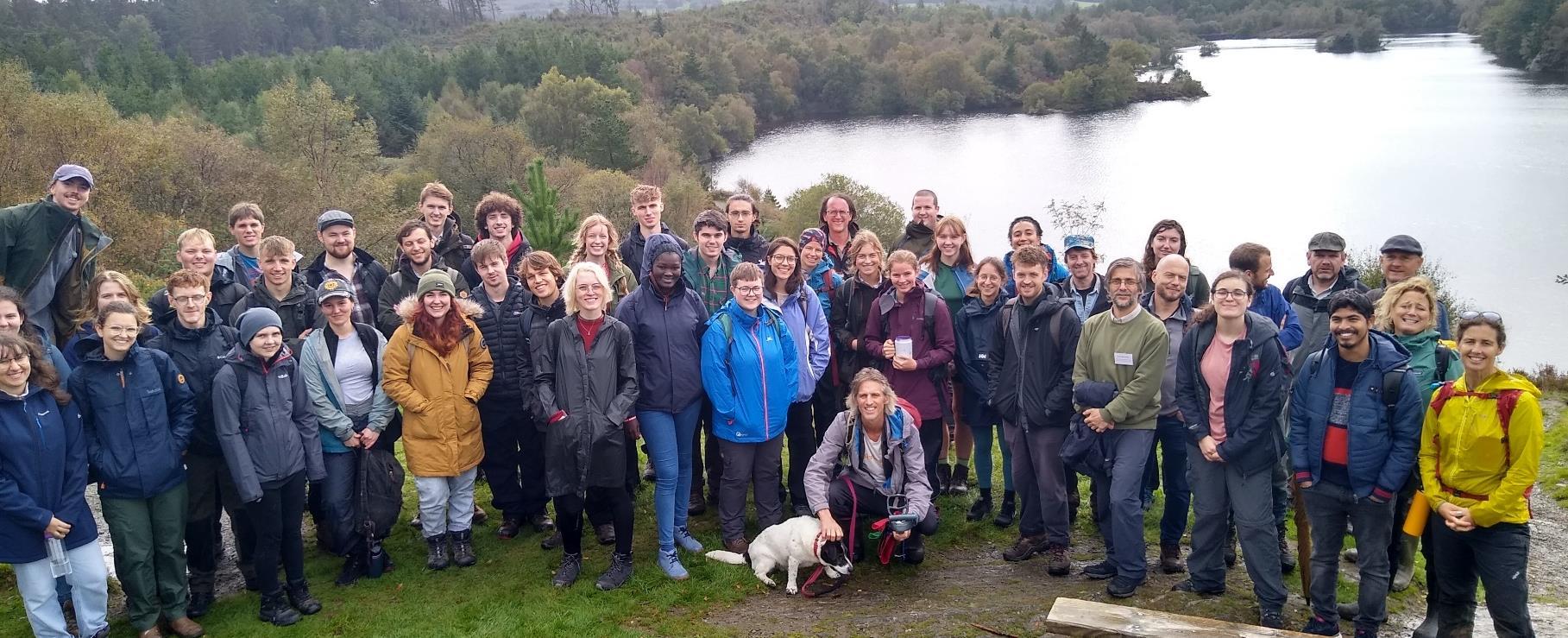
When the editors of this newsletter (Dr James Walmsley and Professor John Healey) asked me to write this piece, I first had to ask myself – why me? Wouldn’t someone else do it better? But, on reflection, I realise I’ve been part of the fabric of Forestry@Bangor for longer than any of my colleagues (Fabric sounds like part of the building... but then I do sit in the room where the kink in the corridor is, occupied by my Tutor, Tom Owen in 1978 and later, by my PhD supervisor Prof. Colin Price...)
I studied Forestry at Bangor from 1978-1981, then spent several decades working as a professional forester, before coming full circle to complete a PhD and become a Forestry Lecturer – a role I’m proud to have gained in 2020. I’ve also ‘walked the walk’, so to speak, managing my own forests in mid-Wales, pushing the boundaries of early transformation to CCF and exploring the limits of restocking through natural regeneration and drone seeding combined with artificial regeneration.
At risk of making us seem like a bureaucracy, Forestry@Bangor is an institution - an unbroken sequence of people with a mission to conduct research of all kinds relating to trees, people and forestry, to educate students in these topics and to inspire, enthuse and challenge the next generation of foresters.
Many, perhaps most, have graduated, gone out into the wider world, managed forests and created positive change for biodiversity, people and climate. Some have achieved great things in local government, or policing! There has barely been a break in that chain of teachers, researchers, students and graduates in the last 120 years. Most of you, as readers of this newsletter, have been part of that, in different times and places.
We are also part of another more ancient institutional ideaa University. The history of Western Universities can be traced back to the University of Bologna in the 14th Century. Some of our ideas of academic independence, integrity and freedoms go back that far.
Coming back to Forestry@Bangor, it means we can, and should, sometimes take a step back and allow ourselves and our students to think and argue! The institution has a sort of seniority – there has been a community of people studying forestry in Bangor since before there was a Forestry Commission in Britain. In the past we contributed foresters to colonial forest services (the obituary about John Dolwin in this newsletter, who graduated in 1959, epitomises this era). People from all over the world, from countries which did not exist as states in 1904, have passed through our community. Perhaps 'community' is a big word for a huge range of people who spent a few years here, years or perhaps decades ago?
Yet it’s clear from our engagement with alumni that this is exactly what many of them feel: Forestry@Bangor is a strong, supportive and positive community. A Forestry@Bangor degree really is a badge of honour to be worn with pride.
By writing and reading this we are staying in touch with you. The Forestry@Bangor team relies on alumni for career-long input and feedback - we invite you to stay in touch with us. Recent graduates can tell us how well prepared they were for the forestry world, others can tell us what the latest issues in the 'real' world are.
Your efforts and support will help to ensure that Forestry@Bangor can thrive for another 120 years.
Many
Mary Sutherland (1893-1955) was the world’s first female Forestry graduate in 1916. She had a distinguished career in forestry in the UK and New Zealand and is one of the founding members of the New Zealand Institute of Forestry in 1927. A Mary Sutherland Memorial Redwood grove can be found in Whakarewarewa Forest. This has become a site for pilgrimage for those connected with Forestry@Bangor – the grove was visited by Sarah Ellis (Mary Sutherland awardee in 2020) and by current member of staff, Dr Bid Webb, Lecturer in Agroforestry, more recently in 2023.
Mary’s portrait is by the contemporary Welsh artist, Ceredigion-based Meinir Mathias.
Meinir said “I feel very honoured that it is the first portrait of a woman by a female artist commissioned to hang in the Council Chamber alongside artists such as Kyffin and Whistler. I was also really pleased to have a close look at the wonderful and inspiring mural by Edward Povey.”
Dr Becky Heaton unveiled the portrait during the day in which she received her honorary degree. Becky said, “Even 70 years after Mary Sutherland graduated, it’s not always easy being a woman in forestry – as I well know! I hope it is getting easier but can only imagine how hard it would have been for Mary, she had no role models. I want to pay tribute to her and to two female foresters, Dr Pat Denne and Dr Christine Cahalan from Bangor who were my role models and inspired me. I hope that Mary’s achievements continue to inspire female foresters today."
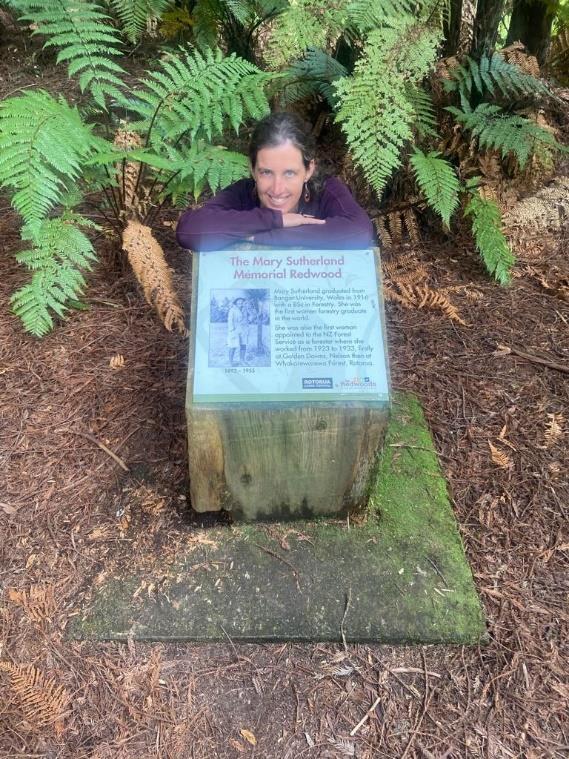

Dr Rebecca Heaton graduated with a first-class Forestry degree from Bangor University in 1993 and went on to complete a PhD on the growing and economics of energy crops at Cardiff University in 2000, followed by postdoctoral research. From 2017-2021, Rebecca sat on the UK Committee on Climate Change. She is a leader in our response to the climate crisis. In 2021 she was selected as one of a hundred ‘women to watch in business’ in the annual survey by Cranfield University, and earlier this year she was appointed to the senior position of Director of Environmental Sustainability at Lloyds Banking Group, overseeing their plan to achieve Net Zero.
Two Mary Sutherland awardees, Sarah Ellis (2020) and Catherine Noble nee Pearson (2021), also attended the unveiling alongside a select group of staff and other alumni including Dr Relena Ribbons (PhD Forestry, 2017).
Professor Oliver Turnbull, Deputy Vice-Chancellor, said, “We are proud to pay tribute to Mary Sutherland, who made hugely significant contributions in her field and had a lasting impact on the world. This painting, created by such a talented artist, will form a visual reminder of her pioneering work.”

Graduates from Bangor University are making an impact around the globe. If proof were needed, one graduate, Susan Chomba (left), who was in the first cohort to graduate with a Masters degree in Sustainable Tropical Forestry, has been included among the world’s 100 most influential women
The list, produced by the BBC includes former US First Lady Michelle Obama, human rights lawyer Amal Clooney, Ballon d'Or-winning footballer Aitana Bonmatí, feminist icon Gloria Steinem and Hollywood star America Ferrera.
This year’s list also highlights women who have been working to help their communities tackle climate change and take action to adjust to its impacts.


Now a director at the World Resources Institute (WRI), Susan Chomba says her experience of childhood poverty in Kirinyaga county in central Kenya motivates her to help improve the lives of others.
She primarily concerns herself with protecting forests, restoring landscapes and transforming Africa's food systems.
From the tropical forests of the Congo Basin to the dry West African Sahel, as well as eastern Africa, Chomba spends time working with smallholder farmers, particularly women and young people, to help them make the most of their land.
She shares her expertise with governments and researchers to build more resilient communities in the face of intensifying climate change.
She says, “I'm more affected by the inaction of world leaders, especially from the major emitters, who also have the economic power to change course but are held back by money, power and politics. To manage those feelings, I bury myself in actions on the ground, working with women and youth across Africa on nature protection and restoration, transforming our food systems and changing policies.”
Academics at Bangor University’s School of Environmental & Natural Sciences were keen to share their congratulations with Susan, Professor Morag Mcdonald, Interim Pro Vice-Chancellor for Science & Engineering and Head of the College said, "Susan is an inspiration, very few of the world's climate scientists are women, and a small fraction of those are African women, a continent hard-hit by climate change. She plays a vital role in empowering and giving women a platform in the in the climate emergency."
“Susan was in the first ever graduating cohort of our European Masters in Sustainable Tropical Forestry and was awarded a dual degree from Bangor and Copenhagen Universities. She was also the first recipient of the Peter Henry Forestry Postgraduate Award. Peter is one of our benefactors and Susan credits the award as being instrumental in supporting her MSc field work in Tanzania which started her research career.”
Of her time studying at Bangor University, Susan says “I remember my student life in Bangor with great nostalgia and respect for the teaching fraternity that played a pivotal role in shaping my career trajectory. The experience they bring from different parts of the world made the content of teaching resonate with a great number of international students like myself. Beautiful landscapes and seascape that surround the campus presented endless possibilities for an inquisitive mind. The relaxed learning atmosphere enabled students to forge friendships and collaborations that have lasted and I treasure to this date.”
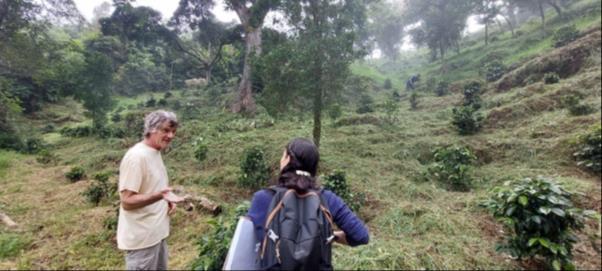
Forestry@Bangor alumni Ken McNamara (Postgraduate Diploma in Tropical Forestry, 2022) and Will Baxter (MSc Forestry, 2021) demonstrated their appreciation and commitment to Forestry@Bangor by generously donating funds to support postgraduate forestry and agroforestry student projects. Successful applicants to the BaxterMcNamara fund were awarded funds to support dissertation research projects and presentation in international conferences in places as diverse as Kenya, Panama, Canada, Uganda and Wales.
Completing a MSc dissertation project is a chance for students to develop specialist skills and understanding. Liann Muñoz Torres, a MSc Agroforestry and Food Security student, took the opportunity to travel to Panama and Costa Rica, interviewing farmers on environmental and socio-economic factors affecting coffee quality. Results from Liann’s work were shared with Costa Rica’s and Panama’s coffee associations as well as with Costa Rica’s foremost agricultural research institute, CATIE, to support coffee production in Latin America. Liann has ambitions to continue her work and complete a PhD in this field. Asked how the opportunity benefitted her, she reveals that it, “strengthened my technical skills and research skills which will be reflected in my future professional development.”
Patrick Otema, a MSc Agroforestry and Food Security student, remarked on the importance of the Baxter-McNamara fund to completing his dissertation project in his home country of Uganda. The fund proved vital to “overcome the financial constraint that was preventing me from collecting data.” Patrick’s work uncovered more about the potential for Farmer-Managed Natural Regeneration in Uganda, a valuable tool to restore landscapes, develop resilience to climate change and improve food security. Patrick’s hard work paid off, commenting that he was able to, “complete my MSc with a distinction…something that would not have been possible without the Baxter-McNamara Fund.”
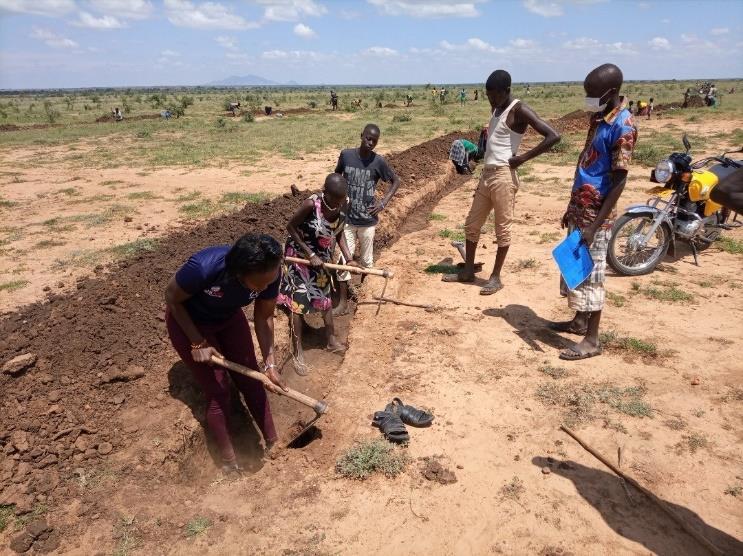


The funds enabled MSc Agroforestry and Food Security student, Michelle Cohen, to work in collaboration with World Agroforestry (ICRAF) in Kenya to investigate the role of fruit trees for climate adaptation and mitigation in East Africa. Alongside her own professional development, Michelle notes the wider impact of the project. She explains that the experience enabled her to “emphasise gendered differences in fruit tree decisions which then informed ICRAF trainings aimed at farmers and nursery owners, on ways to ensure that both men’s and women’s needs are addressed and met.”
Closer to home, Elena Waite wanted to use the opportunity during her MSc Environmental Forestry degree to find potential solutions to meet the demand for sustainable timber production in the UK. Elena was particularly interested in coast redwoods (Sequoia sempervirens) as a viable species for timber production in Wales. She used the award to aid collection of mensuration data to assess a site suitability model, but the first hurdle to overcome was finding the trees! “Quite often the stands were fairly small (under 2 hectares in size) and in remote locations or in the midst of larger forest parks…In one instance, I met some local people who were convinced that no coast redwoods were growing in the forest behind their property, where they had lived for 20 years. After I had spent an uncertain few hours searching through the forest, it was entertaining to return to their property and see their surprise when I told them that there were in fact redwoods growing there!“ Following the completion of her research, Elena hopes that her work, “can help to encourage the consideration of coast redwood as a species that is suitable for planting for timber production in Wales.”
Lukelysia Mwangi, a MSc Agroforestry and Food Security student, was accepted to present her work in Canada at the 5th World Congress on Agroforestry, where the theme was ‘transitioning to a viable world’. The voices of those from lower- and middle-income countries are often not fullyrepresented at international conferences due to the financial burden of attending. Travelling to Canada from her native Kenya proved prohibitive for Lukelysia, but the BaxterMcNamara Award was able to support her travel, enabling her to disseminate her work, learn from others and importantly network with others in her field. “It was a great opportunity for researchers, advisors, and policy makers to listen to key field actors’ voices and to engage with them in a crucial exchange on how to transition to a viable world.”
All the recipients of the award would like to express their heartfelt gratitude to Will Baxter and Ken McNamara for their generous donations.
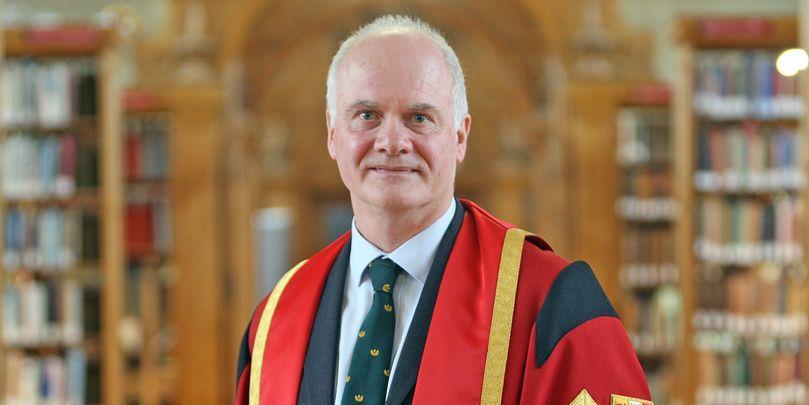
Trefor Owen was awarded a Doctor of Science Honorary Degree for his contributions Public Service at the graduation ceremony in December 2023.
A highly esteemed senior Welsh forestry professional, Trefor has been recognised with a prestigious fellowship from the Institute of Chartered Foresters. His remarkable journey includes serving as the Interim Chief Executive of Forestry Commission Scotland and later as the Director of Land Management, where he played a vital role in overseeing Scotland's forestry estate and its diligent workforce.
Besides his high-profile career, Trefor is truly passionate about education, enhancing the student experience and fostering employability. His strong connection to his alma mater, Bangor University, has always remained close to his heart. For example, as part of this newsletter, Trefor managed to track down virtually every member of the ‘class of 1985’. It’s very striking what this cohort went on to achieve.

Trefor is currently working closely with staff at the University to try to track down Forestry@Bangor alumni with whom we have lost touch.
If you know of any Forestry@Bangor alumni who you think would like to reconnect with their alma mater, please encourage them to do so by visiting this website: https://www.bangor.ac.uk/alumni/update.php.en


Many congratulations to Tom Jenkins, Head of Forest Research in Wales, former Forestry@Bangor Lecturer in Forestry and leader of our distance learning MSc degree programme, for being awarded an MBE in the 2024 New Year Honours List for services to the forestry sector: richly deserved for Tom's stalwart contributions to the ICF, to forest protection, to forestry in Wales and much more.
Sent by John Healey, Professor of Forest Sciences, to Forestry@Bangor colleagues on 26th April 2023
“Dear all,
I am on my way back from the ICF National Conference. There were a good many Forestry@Bangor highlights.
Colleagues Ashley Hardaker and Tim Pagella gave superb talks – real highlights of the programme. Alumnus Peter Wilson was awarded the prestigious Institute’s Medal (for his highly influential role bringing to fruition the whole UK Woodland Assurance Scheme). The President’s Award was given to alumna Shireen Chambers. Alumnus John Everitt, Director of Forestry Chatsworth Estate, was awarded the Hugh Millar Award for Excellence. And Bangor input was very well represented in the concluding presentation by Fiona Lickorish reporting the results of her strategic foresight analysis to address the question “What could the future look like”.
It was good to meet so many Bangor alumni (and current students): they must have represented at least 10% of those present.
All the best,
John”
Healey, J. (2023). How to recognise a temperate rainforest in Britain and Ireland when you see one. The Conversation Article 209182.
https://theconversation.com/how-to-recognise-a-temperate-rainforest-in-britain-and-ireland-when-you-see-one-209182
https://www.bangor.ac.uk/news/2023-07-10-how-to-recognise-a-temperate-rainforest-in-britain-and-ireland-when-yousee-one 10 July 2023
Healey, J. & Tanner, E. (2022). In Jamaica, native trees are being driven further up mountains towards extinction. The Conversation Article 183665.
https://theconversation.com/in-jamaica-native-trees-are-being-driven-further-up-mountains-towards-extinction-183665
https://www.bangor.ac.uk/news/2022-05-30-global-warming-and-an-intense-hurricane-combine-to-drive-tree-speciesup-tropical 30 May 2022
Healey, J. & Walmsley, J. (2022). Bangor University’s response to the forestry skills shortage. Trees – Institute of Chartered Foresters Spring 2022, 28-29.
Storm Eunice damage: Resist the urge to ‘tidy up’ trees felled by high winds, expert pleads. https://inews.co.uk/news/storm-eunice-resist-the-urge-to-tidy-up-trees-felled-by-high-winds-expert-pleads-1472178
Storm Eunice: Resist the urge to ‘tidy up’ trees felled by high winds, expert pleads. https://www.msn.com/en-gb/news/world/storm-eunice-resist-the-urge-to-tidy-up-trees-felled-by-high-winds-expertpleads/ar-AAU6bMX
'I dangled from an 80ft tree to help encourage other women to join the forestry battle' https://www.mirror.co.uk/news/uk-news/i-dangled-80ft-tree-help-28365994
Naturally regrowing forests are helping to protect the remaining old forests in the Amazon https://www.bangor.ac.uk/news/2023-11-17-naturally-regrowing-forests-are-helping-to-protect-the-remaining-oldforests-in-the 17 November 2023
Experts predict ‘catastrophic ecosystem collapse’ of UK forests within the next 50 years if action not taken https://www.bangor.ac.uk/news/2023-11-08-experts-predict-catastrophic-ecosystem-collapse-of-uk-forests-within-thenext-50 8 November 2023
Recycling used wood can make a big contribution to net zero but it needs much better coordination
https://www.bangor.ac.uk/news/2023-10-26-recycling-used-wood-can-make-a-big-contribution-to-net-zero-but-it-needsmuch 26 October 2023
https://www.bangor.ac.uk/news/10/rural-policy-makers-encouraged-to-govern-like-a-forest-in-post-brexit-britain 31 October 2022
Cracknell, D. (2021). Learning lessons in Lady Park Wood. Woodland Heritage 2021, p. 24-26.
https://www.bangor.ac.uk/natural-sciences/courses/distancelearning/documents/Cracknell-Lady-Park-Wood-WH2021.pdf
Environment: Trainee foresters almost guaranteed job – students
https://www.bbc.co.uk/news/uk-wales-66314994 27 July 2023
Revealing the true extent of tropical forest loss from rubber plantations | Bangor University
https://www.bangor.ac.uk/news/2023-10-18-revealing-the-true-extent-of-tropical-forest-loss-from-rubber-plantations
Tropical forest loss from growing rubber trade is more substantial than previously thought – new research | Bangor University
https://www.bangor.ac.uk/news/2023-11-22-tropical-forest-loss-from-growing-rubber-trade-is-more-substantial-thanpreviously
https://www.bangor.ac.uk/news/2023-11-22-tropical-forest-loss-from-growing-rubber-trade-is-more-substantial-thanpreviously
Forests are breaking up in the tropics but coming together elsewhere – here’s what it means for wildlife and the climate | Bangor University
https://www.bangor.ac.uk/news/2023-08-07-forests-are-breaking-up-in-the-tropics-but-coming-together-elsewhereheres-what-it
New theory disproves Leonardo Da Vinci’s ‘Rule of Trees’ | Bangor University
https://www.bangor.ac.uk/news/2023-09-19-new-theory-disproves-leonardo-da-vincis-rule-of-trees
‘Worthless’ forest carbon offsets risk exacerbating climate change | Bangor University
https://www.bangor.ac.uk/news/2023-08-25-worthless-forest-carbon-offsets-risk-exacerbating-climate-change
Bangor University shares expertise in UK projects to increase woodland resilience | Bangor University
https://www.bangor.ac.uk/news/2022-09-27-bangor-university-shares-expertise-in-uk-projects-to-increase-woodlandresilience
Communicating about trees wins competition | Bangor University
https://www.bangor.ac.uk/news/2021-12-03-communicating-about-trees-wins-competition
Is the Amazon rainforest on the verge of collapse? | Bangor University
https://www.bangor.ac.uk/news/2022-03-07-is-the-amazon-rainforest-on-the-verge-of-collapse
Second of two new Alumni portraits unveiled | Bangor University
https://www.bangor.ac.uk/news/2022-07-14-second-of-two-new-alumni-portraits-unveiled
During 2022-2023 Forestry@Bangor has maintained the same high rate and quality of research publications related to forestry as in recent years: our staff had more than 100 peer-reviewed papers in international journals. A notable feature is the increasing integration of research in forests across the School of Environmental and Natural Sciences, within which Forestry@Bangor is nested. Forestry staff are co-authoring with an increasing diversity of colleagues from across the School’s disciplines. Notably, a growing proportion of new academic staff recruited to the School are researching in forests; our high international profile in forest science is a major attraction for them to bring their careers to Bangor.
The work of PhD students also continues to be a major component of our research. While some funding sources for PhD studentships (such as the EU Erasmus-Mundus-funded FONASO programme and the Welsh Government/European Social Fund Knowledge Exchange Skills Scholarship scheme) have come to an end, our UK Government (NERC) Envision Doctoral Training Partnership (jointly with Lancaster and Nottingham Universities) continues to support high-calibre PhD students to carry out forest research projects in Bangor. Another notable development has been the growing depth and breadth of our joint forestry research centre with the Central South University of Forestry and Technology, in Changsha, China, led from Bangor by Professor Andy Smith.
To provide an overview of the main areas of Bangor’s research related to forestry, and a few of the highlights, over the past two years, I have classified our research into 12 subject areas, though there is considerable overlap between them. In fact, research that links fundamental science with the evidence needed to meet major global forestry challenges, and multidisciplinary research are major features of our programme.
A key area of underpinning science is our research on forest soils and tree roots. This links directly to our work in forest ecosystem ecology. A growing research topic has been on the ecology of forest wildlife, including the species that pose a threat to forest ecosystems, notably deer and squirrels, as well as tree pathogens. The threat to forests worldwide, and their biodiversity and carbon stocks, posed by warming and the increasing incidence of severe droughts, as components of global climate change, was also a major focus. The impacts of human deforestation, and degradation of remaining forests, remains a major challenge addressed by our research, though we have combined this with work on the positive response of forest restoration. Bangor has been in the global vanguard of research into agroforestry, and we have sustained this with a notable upturn in research outputs, especially through our long-standing collaboration with World Agroforestry (ICRAF). Reflecting the rapid advance in this technology, we had a growing increase in research on forest remote sensing, both developing the methodology in its own right and applying it to address a growing range of research questions in other fields. There has also been a notable increase in Bangor’s research papers in wood science, centred on the materials group in the University’s Biocomposites Centre, which has an increasingly strong collaboration with the forestry group, including research into the role of the whole value chain from forests to forest products in mitigating climate change. Our research also pays due attention to the important role of forests in delivering other ecosystem services, such as those related to hydrology and aspects of human wellbeing. We have brought all of this together in a growing body of research on social aspects of forestry and forest policy.
Highlights of research into forest soils included new discoveries about the mechanisms controlling carbon cycling by soil microorganisms in afforested sites and the complexity of how this is affected by tree diversity. Discovering the difference between tree species in their effect on soil organic nitrogen dynamics is also important; there are crucial links between carbon and nitrogen cycling in the soil. A major development in tree root research was discovering how root systems of individual trees can be mapped in a mixed tropical forest by DNA sequencing of roots extracted from soil samples.
Linked research in ecosystem ecology showed how tree species richness influenced the decomposition rate of dead wood on the floor of an experimental plantation: it cooled the understorey which reduced the overall rate of decomposition, but increased its spatial variability. New insights were obtained into the complexity of the relationships between tree and fungal species (mycorrhizal and pathogenic fungi) in a mixed sub-tropical forest. There has been a huge surge in research into the so-called functional traits of trees (such as leaf mass per area), however important cautionary evidence about their interpretation was provided by research which showed that the relationship of such traits with the actual survival and growth rates of trees varied hugely between sites over a range of precipitation and soil phosphorus conditions.
Forest wildlife research has included developing the use of camera trap data to measure the presence, and abundance of squirrels and deer in different woodland habitats, the use terrestrial laser scanning to assess the structure of the woodland understorey from a “deer’s eye view”, and how to model the spatial expansion of red deer populations using the sparse available presence-only data. Research on grey squirrels includes the effect of dispersal following repeated culling on population genetic diversity and modelling the mechanisms by which recovery of pine marten populations affects the complex interactions between grey and red squirrel populations and the squirrel pox virus As a further complication, modelling showed how the impact of pine martens on squirrel populations is strongly influenced by fluctuations in the populations of their preferred prey species, the field vole
Researching the effects of climate change on forests we have shown the complexity of different interacting mechanisms. In tropical montane forests two climate-change drivers had a synergistic effect. The increase in elevation of lower altitude species attributed to global warming was accelerated by the impact of major hurricane threatening the survival of upper montane specialist species as their range is push up towards the summits of the mountain range. In the lowland forests of the Amazon, thermal sensitivity was shown to vary in tree leaves up the forest vertical profile; while canopy trees are susceptible to high temperatures, understorey trees may also be vulnerable, especially when their exposure is increased by canopy disturbance. In the Amazon, where water tables are shallow the forests have greater resilience during moderate droughts than do forests on deeper water tables.
Despite droughts causing moderate levels of tree mortality in a high-density temperate tree plantation (the BangorDIVERSE experiment), this did not have a notable influence on light absorption and growth or the way that these were increased by tree species mixtures compared with monocultures. The risk of catastrophic forest ecosystem collapse, due to a combination of direct and indirect climate change impacts was identified as the most significant issue to be addressed in UK forestry over the next 50 years in a horizon scan assessment by a group of experts assembled from across the sector.
Deforestation and forest degradation due to human impacts are the highest priority issues for forestry worldwide. Research using much improved satellite data and cloud computing methodology has produced new high-resolution maps that have shown a far higher rate of forest loss due to the establishment of new rubber plantations (4 million hectares since 1993 in Southeast Asia) than previously realised. This has major policy implications, which were explored in a follow-up paper showing that rubber's inclusion in EU zero‐deforestation legislation is necessary but not sufficient to reduce impacts on biodiversity and risks severe disadvantage to smallholder producers
Modelling studies have provided concerning evidence of the harmful impacts across the tropics of diverse forms of human disturbance, such as deforestation associated with conversion to oil palm plantations, road building and gold mining, on carbon stocks and biodiversity, in particular the populations of conservation-priority primate species. However, in complex landscapes such as Amazonia, the patterns of deforestation and of forest regrowth after agriculture is abandoned have resulted in a large area of secondary forests. Analysis of the location of secondary forests across Amazonia, showed that they played an important role buffering the edges and reducing fragmentation of old-growth forests, with major implications for both climate change mitigation and biodiversity conservation. Even where there is not complete deforestation, there is increasing concern about the effects of degradation of remaining forests. This is occurring in Amazon forests due to many forms of anthropogenic disturbance. Research using a large database of profiling canopy lidar showed that in the most severely disturbed sites canopy recovery was poor indicating a risk of transition to a more open state. Yet in most sites where the anthropogenic disturbance was within the limits of natural disturbance regimes the forests showed notable resilience.
Encouraging evidence for the potential of forest restoration to conserve biodiversity was obtained from heavily deforested landscapes in China, where restored forests were recolonized by locally specialized ground beetle and plant assemblages leading rapid re-establishment of biodiversity at a regional scale. Nonetheless, the type of restored forest has a major impact on biodiversity and livelihood impacts and this variable needs to incorporated into reforestation targets. As a counterpoint to recent, high-profile ecologically-oriented “rules” designed to guide reforestation policy, a new analysis pointed out the importance of refocussing such rules for sustainable ecosystem restoration strategy to make them much more peoplecentred
Madagascar remains a key focus for our policy-oriented research on deforestation and forest degradation. The lockdown during the peak of the Covid-19 pandemic resulted in the temporary cessation of on-site forest protected area management and this was associated with a huge increase in the setting of fires within these areas, highlighting the important role of onsite management. While much land in Madagascar is identified as having high potential for forest restoration a high proportion is untitled land where tenure is often unclear or contested, which is a huge constraint on achieving restoration targets. However, Madagascar does host one important and large-scale case showing that biodiversity offsetting can meet its objectives. Ambatovy is one the largest nickel mines in the world and highly profitable, and has committed to achieve no net loss of forest despite expanding its mined area into biodiverse tropical rainforest. Research using rigorous statistical matching and regression models showed that the mine’s measures to avoid deforestation through off-site biodiversity offset projects did meet their goal of achieving no net loss of forest
While biodiversity “offsetting” (just like offsetting of carbon emissions) does offer enticing prospects of providing substantial new funds for forest conservation and restoration it is beset by challenges. In a different location, rigorous research into the effectiveness of an offsetting policy in Victoria, Australia showed little evidence that it had an additional effect beyond the status quo and thus provided low confidence that it would result in a biodiversity “net gain”.
Bangor’s research in agroforestry continues to benefit heavily from our hugely important strategic partnership with World Agroforestry, now integrated with the Centre for International Forestry Research as “CIFOR-ICRAF”. A large meta-analysis showed the huge benefit (+38%) in rice yields created by agroforestry compared with no-fertilizer and no-tree controls, through the key mechanisms of pre-rice green manuring and benefits of hedgerow alley-cropping. However, these agroforestry benefits were reversed with fertilizer application. A major focus has been social science research into the importance of context-specific understanding of how relational values (in particular relevance, trust and place attachment) determine locally adapted knowledge and innovations, which are key for communication strategies for effective extension of agroforestry. Another key Bangor partnership is with the Centro Agronómico Tropical de Investigación y Enseñanza (CATIE) in Costa Rica, which resulted in the first quantification of the potential of trees to offset ruminant greenhouse gas emissions through their carbon sequestration in a silvopastoral system. Life cycle assessment showed the important role of agroforestry trees in reducing the carbon footprint of milk production.
There has also been a notable increase in our research on agroforestry in the UK, with a particular focus on how trees can improve the sustainability of farming, including the welfare of livestock through provision of shelter.
Our research on the use of remote sensing for accurate estimation of forest carbon stocks has been underpinned by a major new theoretical advance, showing how the allometric relationships of trees (such as those between height and diameter and between diameter and above-ground biomass) can be better predicted by separating the functional role of stems in conducting water through the vascular system from mechanical strength, with the rate of conduit widening and location of vessel coalescence up the length of the stem being key to the former.
In a large international collaboration, new models were developed to improve the accuracy of estimating aboveground biomass density from NASA’s Global Ecosystem Dynamics Investigation satellite platform collecting full waveform LiDAR data, which have been rapidly implemented by researchers worldwide. Focussing on the practicalities of mapping global forest above-ground biomass a new comprehensive framework has been developed to assess the accuracy and uncertainty of these maps through the comparison of remote-sensing and forest inventory-plot data.
A review of knowledge gaps, challenges and potential directions assessed the application of remote sensing for accurate monitoring of forests under continuous cover forestry management, such as forecasting their yield, linking to individual tree growth models. A new conceptual model was developed to identify the best ways in which forest characteristics (height, cover and structural complexity) detected by LiDAR can be modelled to quantify the impacts of selective logging and subsequent forest recovery
A central feature of Bangor’s research into the role of managed forests in mitigating climate change has been to link the carbon dynamics of the forest itself with that of the ‘value chain’ of the wood products harvested from the forest to encompass the whole system life cycle. This is exemplified by life cycle assessment research showing the large contribution that circular wood use can make to global decarbonisation but, taking the example of the UK, just how much this goal is being held-back by the lack of cross-sectoral coordination in the whole forestry-wood products chain. The key steps needed to overcome these constraints through system chain were identified.
This system level assessment is underpinned by the programme of wood science research of the materials group in the Biocomposites Centre. A major feature has been fundamental research of the mechanical and chemical basis through which wood modification, such as through heat treatment or phenol urea formaldehyde (PUF) resin, influences its strength. Large variation was found between wood species in the effectiveness of PUF. Novel research showed the potential for use of fine-scale laser-incision of radiata pine for increasing uptake of chemical and preservative treatments, and the critical effect of wood anatomy on the incision process. Effective treatment of wood used in outdoor settings against decay and fire risk remains a major challenge: life cycle assessment showed that tannin-boron preservative treatment has a low overall environmental impact, with important implications for expanding its future use.
Our research into the impacts of trees and forests in delivering ecosystem services goes well beyond climate regulation. Fundamental research combining measurement of root morphology and soil hydrology in the BangorDIVERSE experiment at Henfaes showed that the fine root biomass of ash was much greater than that of the six other species tested, and was closely associated with soil pore-size distribution and hydraulic conductivity. This indicates the great potential advantage of this species for natural flood management, a sad irony given the devastating impact of ash dieback disease. Modelling of ecosystem services and life cycle assessment are two alternative approaches to quantify the environmental benefits or burdens of land management alternatives. Each has distinct strengths and weaknesses but these methods are strikingly hard to integrate – a challenge being addressed through a new development from our research. To tackle the challenge of integrating biodiversity into ecosystem service models two new pathways have been developed to incorporate the biodiversity-ecosystem function relationship. Poor access to, and knowledge of, ecosystem service models is a major barrier to their uptake, especially in the world’s poorer regions, which has been tackled by the development of ensembles of multiple models, which has been shown to increase their accuracy and increase potential to support policy and decisionmaking.
A major programme of research on social issues in forestry has been developed, including new insights on forest manager perspectives on forest health Important new evidence was revealed on the effect of nature-based interventions in woodlands on wellbeing and on perceptions of the natural environment and what this means for social return on investment
Framing the complexity of landscape decision-making as a governance approach can improve stakeholder collaboration. To make this effective in a holistic participatory process a suite of four different approaches need to be incorporated: (i) power and market gain; (ii) ecosystem services; (iii) place-based identity; (iv) ecocentric perspectives.
Linking through to forest policy, a ten-year study using economic services valuation of forest conservation in the Eastern Arc Mountains of Tanzania, a global biodiversity hotspot, has enabled quantification of the huge disparity between global net economic benefits of conservation and the substantial net costs borne by local rural communities. This has major policy implications highlighting the need for much more global investment to disaggregate and mitigate local costs in order to ensure equitable balance between conservation and development objectives. There is a rapid expansion of financial investment to protect and restore forests worldwide, but this has revealed major concerns about regulatory aspects and lack of reliable evidence of effectiveness. Bangor research is influential in the highly topical and controversial issue of the effectiveness of certified carbon credits to offset emissions used to pay for forest conservation and restoration (and increasingly the development of equivalent approaches for biodiversity offsetting/net gain). This has shown the important need for improved methods to establish the additionality of project interventions and to calculate leakage and risks of impermanence of the benefit.


Two staff members have been awarded professorships in the recent round of promotions at Bangor University.
Andy Smith (above left) was appointed as Professor of Forest Ecology; his research and teaching focuses on silviculture, ecophysiology, biogeochemistry and tree-soil interactions, with an emphasis on species diversity and ecosystem function in undisturbed and managed forests.
Graham Ormondroyd (above right) was appointed as Professor in Wood Science. Graham is the Head of Materials Research in the university’s Biocomposites Centre and is the Vice President of the Institute of Materials, Minerals and Mining (IOM3).
Andy and Graham join Bangor’s two existing forestry professors – Professor Morag McDonald and Professor John Healey MICFor. Morag is Professor of Ecology and Catchment Management and is now also Interim Pro Vice-Chancellor and Head of the University’s College of Science & Engineering. John has the ‘established chair’ of Forest Sciences in the university, the eighth holder since the inaugural Professor of Forestry, Fraser Storey, was appointed in 1910.

Since joining Forestry@Bangor in mid-2022, Dr Marielle Smith (Lecturer in Forest Sciences) has been working hard to organise, convene and host an excellent series of research seminars, jointly with our partners at the Central South University of Forestry and Technology (CSUFT). These have been hugely successful, linking staff and research students at both institutions not only with each other, but also with other experts working at the forefront of forest research in a whole range of different institutions.
If you’d like to be added to the mailing list for these seminars, or be considered as a potential speaker, please email forestry@bangor.ac.uk
2022-2023
• 16 Nov 2022: Farnon Ellwood (Bangor University): ‘The highs and lows of rainforest canopy research’
• 15 Feb 2023: Tyeen Taylor (University of Michigan & Bangor University): ‘Sniffing out mechanisms of tropical forest-climate interactions in the Amazon’
• 19 April 2023: Shuguang Liu (CSUFT), ‘The ecological discipline at CSUFT: education, research, and opportunities for collaboration’
• 19 May 2023: Robin Hartley (Scion Research, NZ Forest Research Institute): 'Towards a digital future: Recent advances in New Zealand forest research’
2023-2024
• 27 Sept 2023: Amin Soltangheisi (Bangor University), ‘Effect of elevated atmospheric CO2 on phosphorus fractions in a mature temperate oak forest at BIFoR-FACE'
• 18 Oct 2023: Yuhong Li (CSUFT): 'Regulators of soil organic C mineralization in paddy soil'.
• 6 Dec 2023: Eilidh Forster, John Healey and David Styles, presented by John Healey (Bangor University), ‘Can temperate forests meet targets for climate change mitigation and increasing global wood demand?’
• 17 Jan 2024: Mat Disney (University College London, UCL): ‘Weighing trees with lasers: new insights into forest structure and function from the tropics to urban churchyards’
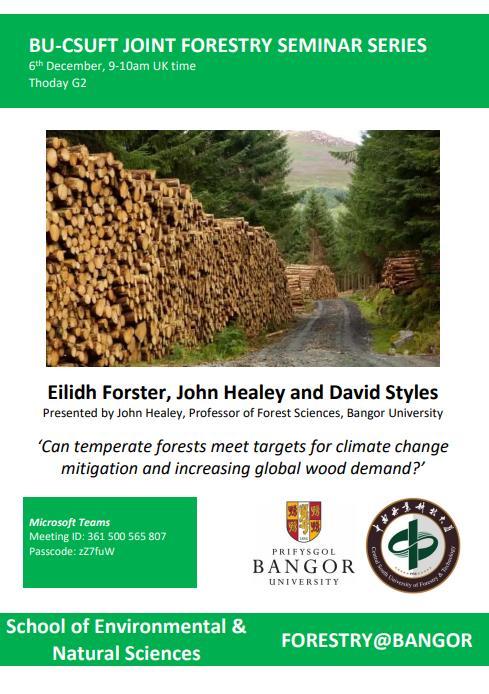
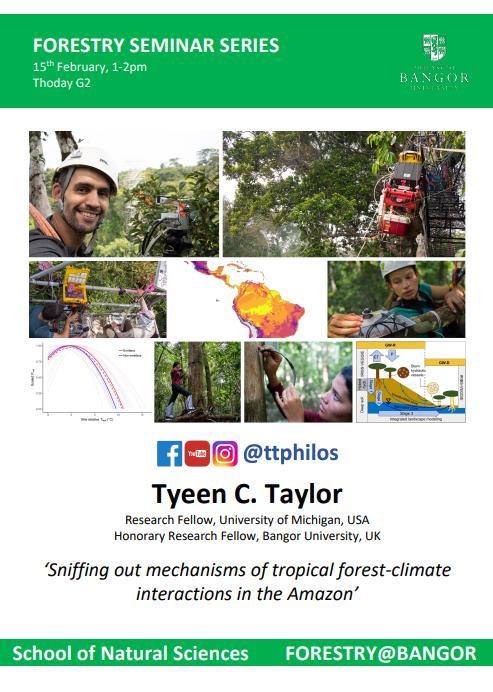
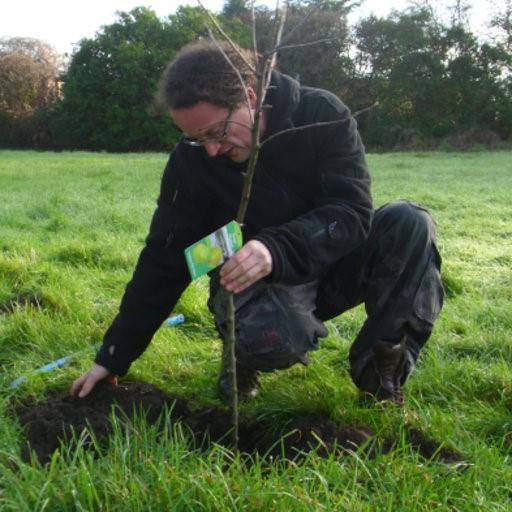
Dr Tim Peters, Lecturer in Woodland Management
Tim is the first Forestry@Bangor lecturer to have the title ‘Lecturer in Woodland Management’, highly apt given that he’s the programme director for our new degree in BSc Woodland Management and Conservation (first intake in September 2022). Tim is responsible for the creation, organisation and delivery of a brand-new module entitled ‘Woodland Conservation’ , which is running for the first time in academic year 2023-24.
Tim is a double Forestry@Bangor graduate – BSc Forestry (2014) and PhD Forestry (2020). Tim is passionate about involving people with woodlands and is a founding member of Llyn Parc Mawr Community Woodland (founded in 2016), one of the most successful and dynamic community woodland groups in Wales. Tim’s teaching and research interests are broad, ranging from below-ground ecology, plant-microbe symbiosis, tree nursery practice and it’s impact on sustainable forestry, as well as – of course – woodland management and conservation.

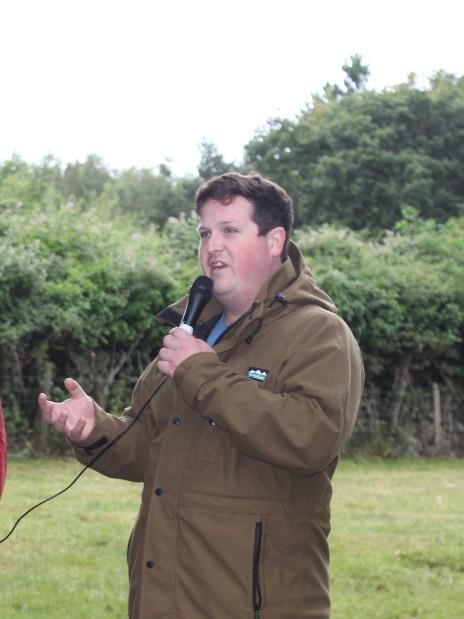
Dr Ashley Hardaker, Lecturer in Land Management Planning and Economics
Ashley is the first Forestry@Bangor lecturer to have the title ‘Lecturer in Land Management Planning and Economics’. He is an interdisciplinary teacher and researcher with a focus on land and it's management in rural contexts. His teaching and research focusses on the way rural land is used and managed, with forestry, agroforesty and agriculture being the main focal systems. He is particularly interested in undertaking research to inform decision making surrounding adaptions and transformations of land use in rural areas to address critical contemporary environmental and social challenges. Ashley engages with a range of research disciplines including decision analysis, qualitative research, economics, life-cycle assessment, ecosystem services modelling and operations research.
Ashley is currently programme director for BSc Conservation with Forestry. He oversees both our undergraduate and postgraduate modules in Forest Management Planning and contributes to a wide range of other modules. Ashley is a double Forestry@Bangor graduate (MSc Environmental Forestry 2015, PhD Agroforestry 2021). He originally began training as a land agent and agricultural surveyor having gained a BSc degree in Rural Land Management from the Royal Agricultural University. Ashley’s PhD analysed how trees can be used to enhance ecosystem service provision in agriculturally dominated uplands of Wales.

Marielle Smith joined the Forestry team at Bangor University in August 2022 as Lecturer in Forest Sciences. A broadly trained ecosystem ecologist, most of her research is focused on understanding how forests in the Brazilian Amazon are responding to climate and land-use change, in collaboration with international teams based in Brazil and the United States. In addition, she is excited to have recently started researching forests in Wales with colleagues at Bangor University. Marielle is interested in understanding forest structure and function across scales (from leaf to ecosystem), and uses a variety of methods including field-based and remote sensing. She is module organiser for the MSc-level Forest Inventory, Assessment, and Monitoring module, and contributes to the Scotland and Uganda study tours.
Marielle has a BSc in Ecology and Environmental Management from Cardiff University, an MSc in Science Communication from Imperial College London, and a PhD in Ecology and Evolutionary Biology from the University of Arizona. Her PhD research helped to resolve key uncertainties associated with the responses of tropical forests to high temperatures and droughts.
Before moving to Bangor, Marielle spent five years working as a Postdoctoral Research Associate at Michigan State University (MSU). At MSU, she led a project to investigate the patterns and drivers of Amazon forest canopy structure over large-scale environmental and land-use gradients by collating a novel database of forest structure data (from ground-based lidar) for the Amazon, encompassing 370 forest plots.

Heli was promoted to the role of Lecturer in July 2023. Her research interests include interactions between the natural environment, human health and wellbeing as well as socio-geographic dimensions of greenspace use and access. She completed a cross-disciplinary PhD at Bangor University; a collaboration between the School of Natural Sciences and the School of Psychology, in partnership with The Woodland Trust, during which she examined the benefits of woodland activity programme provision on personal wellbeing and investigated barriers and enablers to woodland access and use.
Heli contributes to a wide range of Forestry@Bangor activities, including the organisation and delivery of the postgraduate module in Social Issues in Forest Management, as well as contributing to the postgraduate Urban Forestry module, and supervising a range of MSc dissertations closely related to her research interests.
Timber quality and carbon within complex farm woodlands
Postgraduate research by Heddwyn Bye
Starting in October 2023, Heddwyn’s Masters by Research project centres on investigating the efficacy of terrestrial laser scanning (TLS lidar) for the quantification of timber quality and carbon content of trees within complex farm woodlands in North Wales. Trees in farm woodlands are a potentially valuable yet underutilised source of timber. Heddwyn will survey a range of sites using both laser scanning and traditional forest mensuration techniques in order to evaluate the accuracy and efficiency of TLS in application to farm forestry. This project is in partnership with WoodKnowledge Wales, as part of their Home Grown Homes 2 project aimed at promoting the expansion of Wales’ home-grown timber resource and developing a thriving timber economy in Wales.
Having graduated from the University of Sheffield with a BSc in Biology, Heddwyn worked in arboriculture, forestry and sawmilling in North Wales. He aims to use this practical experience and understanding of the industry to promote the development of a practical tool to better understand the economic value of farm woodlands in Wales and thus promote their expansion.”
Postgraduate research by Thomas Henderson
Alongside Heddwyn, Tom Henderson began his postgraduate Masters by Research project in October 2023, having just graduated with a BSc in Conservation with Forestry at Bangor Expanding commercial forestry in Wales has enormous potential to mitigate rising atmospheric CO2 emissions. Forestry plantations managed for high quality construction timber production can capture vast amounts of carbon and associated processing and construction value chains can store it in the built environment, while reducing dependence on traditional more resource intensive materials. The societal benefits or ‘ecosystem services’ provided by forest ecosystems, however, range far beyond carbon sequestration and the provision of building materials. They are complex and dynamically interconnected. This Masters by Research project uses LCA (Life Cycle Assessment) based modelling to assess the ecosystem service impacts, both positive and negative, of entire timber product systems considering where and when the delivery of, and damages to, the production of these benefits are distributed along the value chain.
The aim of this modelling project is to analyse different options for new woodlands and timber processing systems, and by incorporating a range of ecosystem services, such as those that support and regulate ecosystem processes, could inform a regenerative approach to timber industry expansion in Wales.
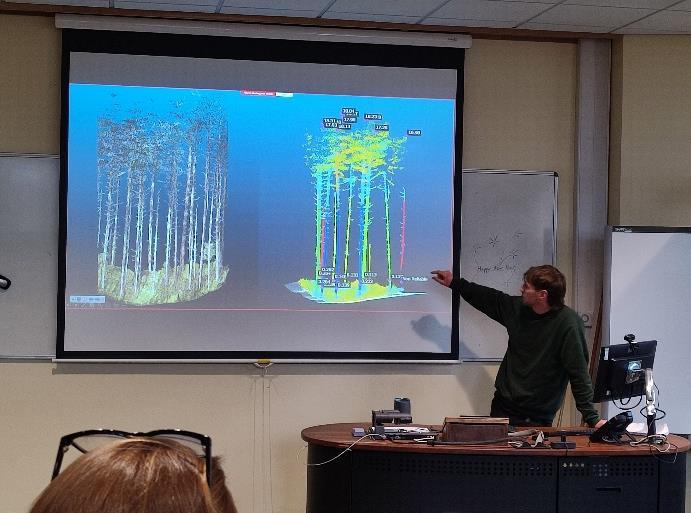

Kate (Left in top image opposite) started her NERC Envisionfunded PhD in Forestry at Bangor University in October 2023. Her research investigates drought responses and drivers of Amazon forest phenology across soil moisture gradients. Much of our knowledge of tropical forest drought responses comes from deep water table forests, while shallow water table forests are severely under-researched, despite occupying c. 50% of the Amazon basin. Evidence suggests shallow water table forests are more resilient to moderate drought than deep water table forests, challenging current predictions of climate change on Amazonian forests, but that they could collapse under very strong droughts.
This PhD research will quantify seasonal patterns of key components of forest carbon (vertical leaf area distributions from ground-based lidar, tree woody growth from dendrometers, and leaf flush from monthly field observations), and test potential drivers, including soil moisture, microenvironmental conditions, and tree hydraulic strategy. This project will draw on existing field plot and remote sensing datasets, in combination with new on-the-ground measurements collected as part of a forthcoming 12-month field campaign in the Brazilian Amazon from mid2024. She is supervised by Drs Marielle Smith, Simon Willcock (Bangor University), Tyeen Taylor (University of Michigan and Bangor University), and Juliana Schietti (Federal University of Amazonas, Brazil).
Kate’s background is in conservation, invasive species, and landscape-scale ecological connectivity. She holds degrees from the Universities of Otago and Auckland in New Zealand, and has five years of industry experience, primarily as an ecological consultant specialising in research and development of invasive species management tools. She also has a keen interest in engaging forms of science communication, including creative non-fiction.
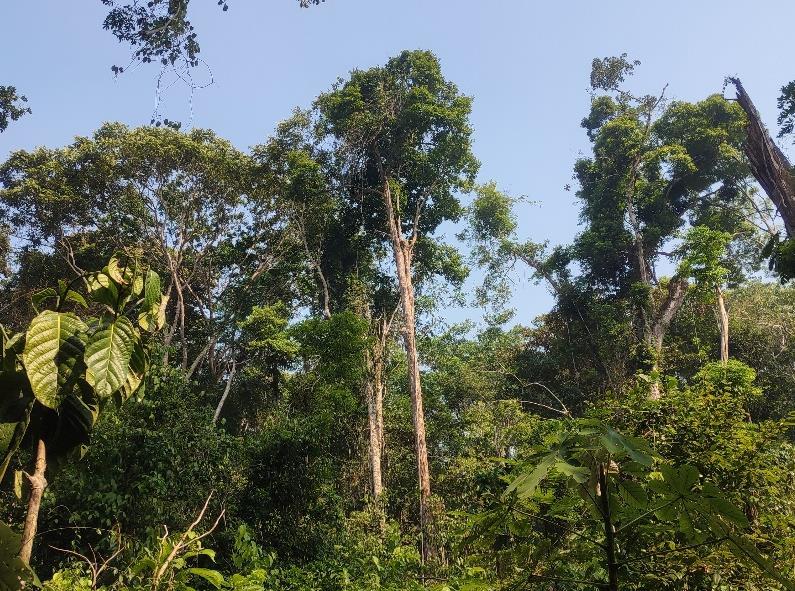

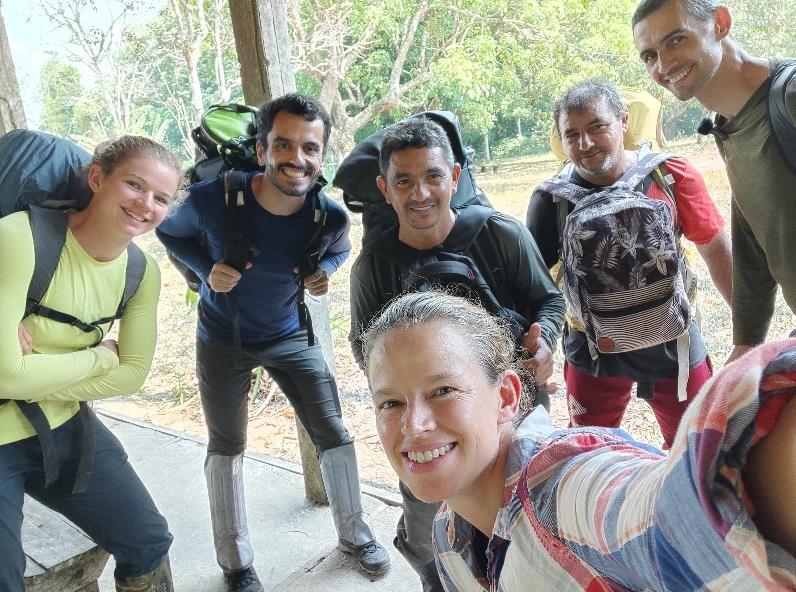
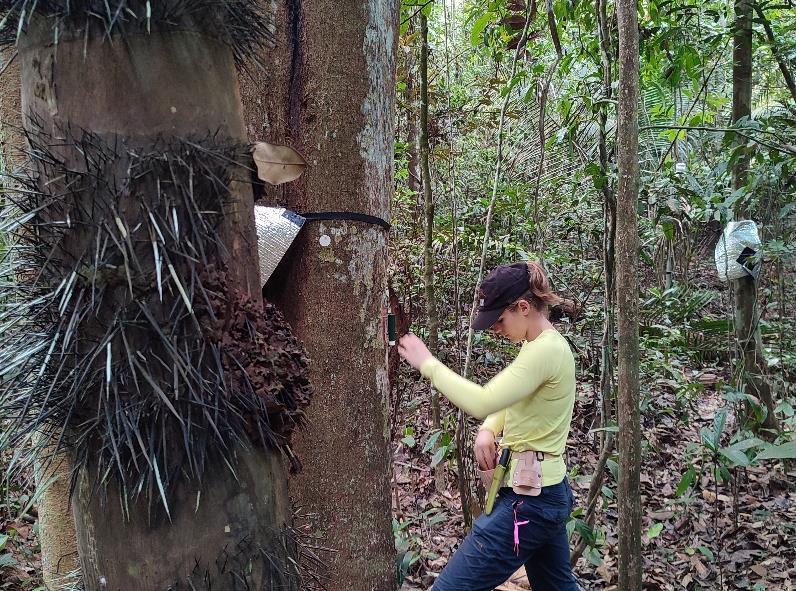

 Photo credits: Kate Heaphy
Photo credits: Kate Heaphy
Royal Forestry Society North Wales Division Bangor Bursary
Roll of Honour for the ‘Royal Forestry Society (RFS) ‘Bangor Bursary’ for the best final year ‘forestry project’
2004 Christopher Guest
2005
Clive Ellis
2006 Andrew Smith
2007
2008
2009
2010
2011
2012
2013
Ikuyo Ishikawa
Simon Morath
2014
2015
2016
2017
2018
Sebastian Nehve-Rogers 2019
Marc Brouard
Sam Brown
Amy Lotay
Daryl Hughes
Will Daniel's BSc Forestry Honours Project was titled "The effect of tree shade on the productivity of maize". This project was the product of Will's own inspiration and initiative, based on his observations of variation in crops with proximity to hedgerow trees in Cornwall. Following careful negotiation with the farmer in question, Will implemented a wellstructured sampling regime. Following innovative analysis of the resulting data he obtained robust evidence of the variation in maize height and total cob volume with distance from hedgerow trees with a striking difference of 250% between their south and north sides, reflecting the strong directionality of the shading effect. While there were differences in effect amongst tree species these were of a much smaller magnitude. Will then used these results to estimate the economic impacts of hedgerow tree shading on crop yield at a field scale. All together this represents a remarkable achievement for a BSc project, producing scientific data of publishable quality, whilst also providing important evidence to inform policy and practice relating to the on-going challenge of meeting the twin objectives of combining food security with the benefits of increasing tree cover as a component of agricultural landscapes.
Will attended a Royal Forestry Society meeting on 30th June 2022, where he was presented with his award by the North Wales Division Chairman, Mr Robert Jones Perrot. He also attended his graduation ceremny at Bangor University, where was presented with his award by Senior Lecturer in Forestry, Dr James Walmsley
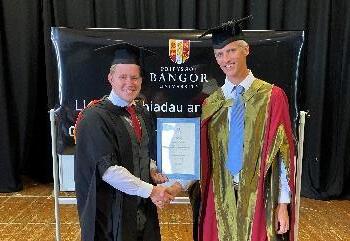
Tim Peters
Byron Braithwaite
Robert Turner
Felix Gregory
Zac Blow
John Trimble
2020
2021
2022
2023
George Dennison
Karen Batten
Will Daniel
John Hughes
John Hughes’ BSc Forestry Honours project was titled “Should animal grazing be regulated as part of the strategy to restore a forested landscape in Snowdonia national park?”. Both his examiners commented on the excellent quality of the dissertation, including attention to detail, originality, and overall coherence. John used great initiative to locate six of the original livestock exclosure plots which had been set up by the Nature Conservancy Council between 1957 and 1968 to study the effects of livestock exclusion. He then randomly selected twelve ‘control plots’, matching the characteristics of each of the ‘treatment’ (i.e. exclosure) plots. 36 trees were located in three of the six ‘treatment’ plots (i.e. where no grazing had taken place for several decades); the predominant species being Sorbus aucuparia Not a single tree was found in any of the ‘control’ plots. John concluded that “…restricting grazing is likely to only be of long term benefit to restore a forested landscape within SNP, and could be used alongside other nearer-term strategies such as re-planting”.

We are very grateful for the continued support of the Institute of Chartered Foresters for running their ‘Best Student Award’, which is given to the student who shows the greatest improvement in their grades between 2nd year and final year. Winners receive a years’ worth of annual membership of the ICF at Associate level, which is significantly more valuable than annual student membership.


Mary Sutherland was the first female forestry graduate in the world in 1916, which was of course at a time of great suffering and social change during the First World War. She went on to a distinguished forestry career and her memory is very much still alive today, including the publication of a biography celebrating her life in 2019, and we unveiled a new portrait of her in the Bangor University Council Chamber following the forestry cohort degree ceremony in July 2022. The 2022 winner was Lamorna Richards.
Professor Morag McDonald, Dean of College, wrote the following message to Lamorna to congratulate her on her award: “The Mary Sutherland Award was launched in 2016 to celebrate the 100th anniversary of Mary Sutherland’s graduation. It is presented to the best female forestry graduate each year. Your contributions to Bangor University during your studies with us have been outstanding. You worked tirelessly to support your fellow students, showing excellent collegiality, kindness and ambition. Despite ongoing Covid restrictions your BFSA presidency saw a huge range of exceptionally high-quality activity, including the first ever joint BFSA – Woodland Heritage online guest lecture. Your efforts to engage with the wider forestry profession have been fantastic. Your role in helping to organise the Institute of Chartered Foresters ‘Young Professionals Conference’ in December 2021, and your exemplar conduct whilst on placement with Natural Resources Wales, epitomise the spirit of the Mary Sutherland award. The University is delighted to present you with this award for 2022.”
The 2023 winner was Esther Bloor, a truly deserving winner of this prestigious award. Esther was recognised for her outstanding academic achievements and for her wider contributions to the School and the University.
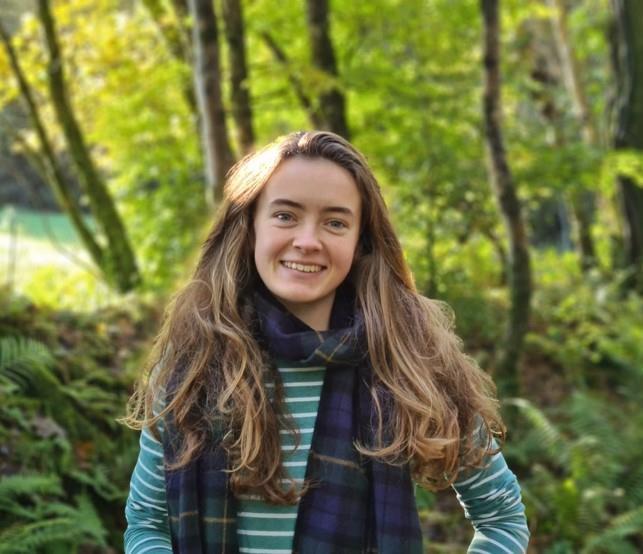

Launched in 2023, this award is made to the student on one of our suite of undergraduate degree programmes who has demonstrated the biggest effort or overcome significant challenges.
Roll of Honour for the Royal Forestry Society Student of the Year Award
2023 Tom Chance
Nicholsons Lockhart Garrat “Best Management Plan” Award
Roll of Honour for the Nicholsons Lockhart Garrat “Best Management Plan” Award
2022
Mike Warner Borrow
2023 David King


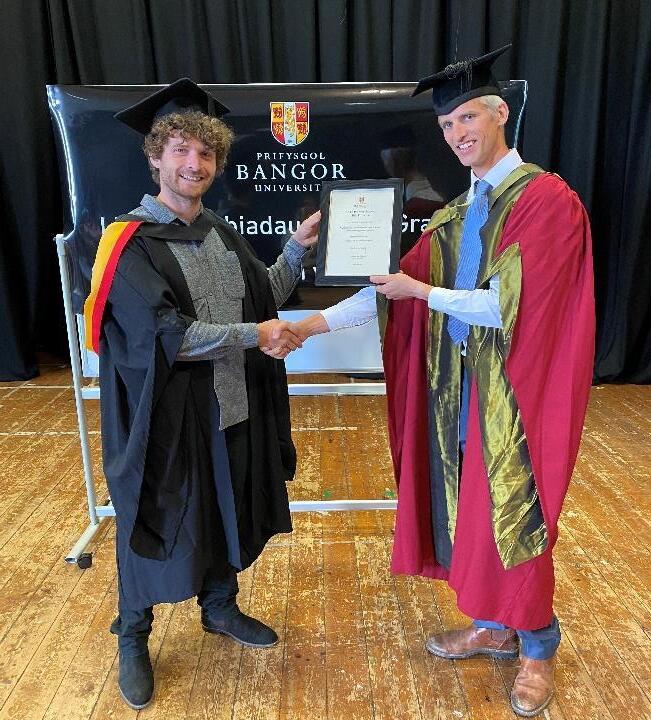 Above right: Tom Chance
Left: David King and Steve Backshall
Right: Mike Warner Borrow and James Walmsley
Above: Esther Bloor with Steve Backshall
Above: Lamorna Richards
Above right: Tom Chance
Left: David King and Steve Backshall
Right: Mike Warner Borrow and James Walmsley
Above: Esther Bloor with Steve Backshall
Above: Lamorna Richards
Peter Henry graduated with BSc Forestry from Bangor University in 1948 and enjoyed a highly distinguished career as a Forestry Advisor for the UK Overseas Development Administration. He has a particular interest in tropical dry forests, and the award is made to the postgraduate student who gains the highest mark for a dissertation relevant to dry forest research
Peter Henry visited the University in October 2022 to meet with current staff as well as some past and current students, and to learn more about how his award has continued to encourage and inspire. During his visit he kindly donated to the University a book that he published in 2010, titled ‘All Our Yesterdays: Memories of a Forester in Nigeria, 1950 - 1962’.
Roll of Honour for the Peter Henry Award for the ‘postgraduate student who gains the highest mark for a dissertation relevant to dry forest research’
Cocoa production in Ghana: A comparative analysis of the impact of adverse climate on the yields of cocoa produced under shade and full sun systems
Phil Johnson worked for Tilhill for many years and was Regional Manager for England and Wales when he passed away following a short but valiant battle against cancer eleven years ago. During his career he made a huge contribution to the company and forestry alike, including setting up the UK’s largest privately owned mountain bike centre at Coed Llandegla, Wales.
As part of the company’s work to strengthen links with students, Tilhill offers awards to top performing forestry students at leading universities that offer degrees in Forestry. The Phil Johnson Memorial Award was set up in 2015 and is awarded to the best performing student on the MSc module in Silviculture, which students on the various postgraduate Forestry@Bangor programmes complete. The company also runs a competitive graduate placement scheme to which several Bangor University graduates have recently been recruited.
2015
2016
Patrick Duffy
Mary Crossland
2017 Harry Thomas
2018
2019
2020
2021
Maaike Felstead
Ed Lewis
Cameron Pellet
Chris Rawlinson 2022
Kate Palmer 2023
Gregory Adamson
Kate was presented with a specially carved wooden trophy together with £250 prize money. The presentation took place at a Tilhill managed woodland near Dundee and was awarded by Tilhill’s North Scotland Area Manager David Bruce.
Kate was studying the MSc Environmental Forestry degree on a part-time basis when she received the award, and at the same time had just been successful in gaining a forestry industry role at Pryor and Rickett Silviculture. The part-time nature of her studies meant she was able to work towards completing her degree whilst working in her new role. Upon receiving the Award, Kate said: “It’s a huge honour to win this award, especially considering how knowledgeable, experienced, and engaged my course mates have been throughout the silviculture module. It came as a huge surprise to hear I had won, and I am really grateful to Tilhill for supporting the award.

“The silviculture module culminated in an extended essay of my own choice considering a case study within the context of ‘silviculture within a changing world’. I focused on the effect of climate change on pine forests in East Scotland and the silvicultural systems and potential mechanisms to mitigate it. This opportunity to deep dive into a topic was pivotal for developing essential forestry knowledge which will underpin my future forestry career.
“Bangor University has been very supportive in accommodating part-time distance learners like me. The lecturers have been approachable and have gone above and beyond to ensure distance learners can fully engage in their studies and feel that they belong to the vibrant Bangor forestry community.
“As for my future, I’m looking to apply my consultancy skills in the forest management sector. I’m excited to join the industry at this interesting time.”
David added: “I am delighted to have had the honour of presenting Kate with this very special award. Tilhill is proud to be supporting this award at a university where we often receive outstanding graduates. Kate is clearly a top performing student and we wish her the absolute best for her future in the forest industry.”
James Walmsley and Mark Rayment, Senior Lecturers in Forestry at Bangor University, said of Kate and the Award: “We would like to thank Tilhill for once again supporting this prize. It is awarded to the top-performing student in the Silviculture module of Bangor’s Forestry and forestry-related MSc programmes. This year, the competition for the prize was fierce: the module was completed by nearly 100 students from across the globe. Kate was an outstanding student with an astonishing average mark for this module of 91%! Kate has since proved this score was not a one-off, achieving similar marks on other modules. Kate will shortly commence a new role in the private forest management sector, bringing valuable enthusiasm, expertise and academic excellence into the profession. She is totally deserving of the Tilhill Phil Johnson Memorial Award for best Silviculture student.”
Adapted from https://www.tilhill.com/resource-hub/our-news/tilhill-presents-special-forestry-award/
Gregory Adamson has won the Tilhill Phil Johnson Memorial Award for Best Silviculture Student 2022-23 on the MSc Silviculture module.
He was presented with a specially carved wooden trophy along with £250 prize money. The presentation took place at a Tilhill managed woodland near Todmorden, West Yorkshire and was awarded by Tilhill’s Regional Manager David Conway and Senior Forest Manager Dylan Cammack.
Upon receiving the Award, Greg said: “I’m stunned and honoured. The course is full of sharp and forward-thinking students, for my work to be selected from this bunch is really something. For Tilhill to run this award in memory of former employee Phil Johnson is very touching and I’m very grateful to have won.
“The course balances the tight rope walk of challenging, engaging and rewarding. My favourite part so far has been the lectures which challenge any preconceived notion of the forestry status quo.”
Greg is studying on the MSc Environmental Forestry degree course in which he won the best performance in the Silviculture module, for his writing on the topic of ‘Validity of utilising monocyclic silvicultural systems of even-aged, mixed species highforest, in the context of increased flood risk caused by a changing climate and the changing role of forests in society’. Monocyclic systems involve harvesting all trees during a single operation, relying on seedling regeneration to develop into the next even-aged crop over a rotation.
David Conway, Tilhill’s North & Central England Regional Manager said: “I’m delighted to have had the honour of presenting Greg with this incredibly special award in memory of Phil and celebrating future generations of foresters. Congratulations to Greg on his achievements. It is great to see he is already pursuing a fulfilling career path as an arboriculture consultant with a focus on trees and planting.”
“Our partnership with Bangor University is a long standing one, with many of their graduates joining rewarding careers as forest and harvesting managers within Tilhill and we look forward to continuing this fruitful partnership for many more years to come.” Mark Rayment, Senior Lecturer in Forestry at Bangor University, Said: “Greg’s understanding of silviculture is squarely in the ‘silviculture as applied forest ecology’ school of thought, and whilst his theoretical work is very much informed by ecological theory, his ability to translate this into practical contexts is exceptional. Greg’s interest in public perceptions around forests, plantations and naturalness sets him apart as being not just a technocrat, but also a thinker – Phil would have enjoyed meeting him and the wide-ranging and well-informed discussions that would have followed.”
Adapted from https://www.tilhill.com/resource-hub/our-news/winning-student-awarded-phil-johnson-memorial-award-inwoodland-setting/

Image: Left, Gregory Adamson, Bangor University student and David Conway,Tilhill’s North & Central Regional Manager.
Image credit @Tilhill
On Sunday 10th December 2023, a Forestry@Bangor staff member and 7 intrepid Bangor Forestry Students Association (BFSA) members, braved the cold weather to take some time out from their studies and brush up on their practical forestry and woodland management skills, namely tree planting.
The rendezvous point was the public car park at the bottom of the Abergwyngregyn Valley, where we each collected a planting spade before walking up the road to the old mill café where we turned right onto the steep public footpath snaking up the steep hill, skirting around the edge of Coedydd Aber and on to the Ffridd planting site part of Henfaes, Bangor University’s experimental farm. As we climbed up, the sun shone giving us a beautiful view of the Morfa Aber Nature Reserve and the expansive mud flats behind. Fortunately, the trees had previously been carried up in the farm mule and deposited behind the stock fencing protecting the now struggling Sitka spruce shelter belt from hungry upland sheep. The wind damaged spruce was originally planted several years ago to create some protection for the sheep, from the harsh winds. The site to be planted was reasonably typical of new planting sites in Wales being a marginal windswept upland farm. The native broadleaf trees to be planted, were divided into shade tolerant and light demanding species. Those that require more light were planted in the gaps around the edges of the rectangular shelter belt, whilst those deemed more shade tolerant were found space further into the Sitka block. Morale was high and the planting team soon planted the 200 trees destined for the site.
A massive thank you to all those who gave up their weekend to commit time to this worthy cause!




Every year since 2011, Bangor University has been proud to have been able to provide, through the Commonwealth Scholarship Commission, prestigious scholarships to outstanding scholars from developing Commonwealth countries to study for postgraduate MSc degrees in Tropical Forestry and Agroforestry, via distance learning. Here we review just a few of the achievements and successes of some of these scholars. Our past and present scholars have been using their networks and the knowledge/skills they have learned to achieve in the world of research, policy, practice and communication. Here is a selection.
1. Phillip Kihumuro (Tropical Forestry scholar 2017-2020, below) has been awarded a fully-funded PhD offer tenable at Gulu University and Copenhagen University, starting in January 2024. He will be researching the politics of climate change vulnerability and adaptation in conflict areas. Since completing his programme, Phillip has coauthored a number of publications exploring the connections between agroforestry governance, policy and conservation. Phillip has also played pivotal roles in a number of our tropical forestry study tours since graduating.

2. On the back of the success of the Tropical Forestry/Agroforestry and Food Security study tour in Uganda in 2023, seven of our current scholars (Brian Mayanja, Jabesh Okumu, Cephas Chisanga, Babra Ombewa, Deborah Elesie, Eunice Nimo and Abigail Ngwira) have developed a joint research proposal to assess the role of agroecological knowledge in enhancing climate resilience and social equity in agroforestry systems in sub-Saharan Africa. The scholars, who hail from Uganda, Kenya, Malawi, Zambia, Ghana and Nigeria, have begun discussions with CIFOR-ICRAF to collaborate on the project. This multi-country research will be completed as part of the scholars’ final dissertation phase of their programmes. The research promises wideranging impact across sub-Saharan Africa with the scholars gaining excellent collaborative research experience and high-value outputs.
3. Olaoluwa Adetula, MSc Agroforestry and Food Security current scholar, has made a number of outstanding achievements:
In August 2023, Olaoluwa was recognized as an exceptional youth and selected by the Carrington Youth Fellowship Initiative, CYFI, in Lagos state, Nigeria. CYFI is a dynamic youth-based initiative launched in 2011 by the U.S. Consulate General, Lagos. CYFI brings together Nigerian youth of exceptional vision, skills, and experience to design and implement projects that are having a positive impact on Nigerian society.
Olaoluwa has also been recognized and invited to China as a Winner of the Excellent Youth Action for Global Development, 2023. His project was selected as one of the Top 100 Innovative Ideas across the world to be pitched in China in October 2023. The World Youth Development Forum (WYDF) aims to build a multilateral platform where young people worldwide can contribute to global development, and global efforts are gathered to promote youth development.
Olaoluwa also has his own podcast series, “Harmony Podcast”, where he talks about the connection between environment, lifestyle and culture as well as environmental sustainability. He has used his connections developed through his MSc programme to invite diverse guests and subject matter to the podcast.
Finally, Olaoluwa is the co-founder and CEO of an NGO, Edenworld conservation initiative. This year, they have planted 500 indigenous trees (Terminalia Ivorensis, Terminalia Superba and Mansonia altissimo) in a local community and mobilized a whole community to tree planting and environmental advocacy where they also provided over 300 writing materials to school children in primary school.

Further information about the CSC scholarships at Bangor University can be found below:
Commonwealth Scholarship
Commission Expanding Horizons: The Commonwealth Distance Learning Scholarship Programme, CSC UK, London
Walmsley, J. (2020) Bangor University in Ghana –experiences and insights from recent study tours, Commonwealth Forestry Association, June 2020
Walmsley, J. (2020) Bangor University, Forestry, Ghana, Woodland Heritage and the Commonwealth. More in common than you might imagine Woodland Heritage Journal 2020: pp 94-95.
Collated by Trefor Owen
Surname, First name From Career / Notes
Blessington, John England
Box, Roger England
Burnham, Kim England
Byrne, Kevin England
Chalk, Graham England
Chambers MBE, Shireen Northern Ireland
Chan, Jilly
Hong Kong
Cooper, Patrick England
Dixon, Angus England
Dowell, Alan England
Fraser, Tony England
Glynn, Martin England
Graham, Susan England
Harvey, Kevin England
Kerr, Gary England
Knight, Phil England
Arboricultural Officer Shropshire County Council. Also Chair of Trustees of Small Woods Association.
Tree Officer with Essex County Council.
Forestry contracting followed by forest management roles with Forestry Commission Wales and Natural Resources Wales in south and north Wales.
Director of educational publisher, author and former principal and chief examiner.
Senior Forest Manager with Tilhill in south west Scotland.
Set up forest service for the Bahamian government, followed by focus on urban forestry in Central Scotland. Executive Director of the Institute of Chartered Foresters. Former Chair of Tree Aid. Currently works with a Scottish charity restoring Scotland’s ancient woodlands. Awarded Honorary Fellowship by Bangor University (2015).
Returned to Hong Kong to pursue career.
Career in UK and overseas forest management, timber processing, marketing and certification
Joined Tilhill in Scotland. Set up Groves Forestry, providing forest management services in north-east Scotland.
Joined the Forestry Commission, and followed a researchbased and forest management career in the Midlands.
Worked for the UK Government on tropical forestry in East Africa, the Solomon Islands and Swaziland. Founder of Cornish Sea Salt. Death in 2008.
Initially focussed on reclaiming mineral sites in the English Midlands, now self-employed forest industry supply chain and rural development consultant based in North Yorkshire.
Joined Tilhill in Scotland. Subsequently involved in running a family building supplies business on the west coast of Scotland.
Fountains Forestry before setting up and running a forestry/fencing services business in Devon.
Joined the Forestry Commission and followed a researchbased career in silviculture. Became the Principal Silviculturist in Forest Research and, for 20 years, Editor-inChief of the ICF’s scientific journal ‘Forestry’, published by Oxford University Press.
Career in financial services. Director of asset leasing and business finance company.
Surname, First name
From Career / Notes
Kupiec, John England
Masamba, Chris Malawi
Miller, Mike England
Milnes, Robin England
Mumba, Reg Malawi
Negussie, Gezahegn Ethiopia
Nixon, Chris England
Oakley, Richard Wales
Owen, Trefor Wales
Scott, Steve England
Searl, John Scotland
Career with the Environment Agency in southwest England, currently Innovation Manager.
Returned to Malawi and a career in forest research.
Managing Director of Land Structure Ltd, commercial landscapers based in Milton Keynes
Career with Cheshire Fire & Rescue Service.
Returned to Malawi. National CBNRM Forum Coordinator - Malawi at Coordination Union for Rehabilitation of Environment (CURE).
Worked with WWF East Africa on forest and wildlife conservation from wildlife surveys to long-term planning for biodiversity conservation, including in Kenya, Tanzania, Mozambique and his home country.
Forest management and national environment lead for Forestry Commission Scotland and successor bodies.
Initially forestry contracting, latterly maker and fabrication business in northeast Scotland.
Former HM Forestry Commissioner, CEO/Director Forestry Commission Wales and successor bodies in Wales (Natural Resources Wales) and Scotland (Forestry and Land Scotland). Retired to Ynys Mon. Awarded Honorary Doctorate by Bangor University (2023)
Forest management and grants & regulation with Forestry Commission in England. Director Forest Services.
Regional Manager Scottish Woodlands responsible for the division Flintshire Woodlands, currently independent Forest Manager and also Associate Priest in the Church in Wales.
Smedley, Mike England Unknown
Tsipas, Stephanos Greece
Vandersteen, Richard England
Young, David England
MSc in Applied Ecology 1986. MBA in International Business, Bradford University Management Centre, 1991. Serial entrepreneur ever since.
Career in teaching.
Continues to support community land and forests rights activist non-profits, mainly in West Africa having lived and worked in Ghana, Nepal, China, Thailand, Ethiopia and now in The Gambia.

It is with sadness we learnt that Rory Cramb, one of our former students, died on Christmas Eve, following a tragic accident.
Rory, who graduated with an MSc in Environmental Forestry (2022), was a thoughtful, kind, friendly and gentle individual. As well as a forester, he was a keen historian and a talented rugby player. He will be hugely missed by all who knew him. He was about to start his new life with his girlfriend Georgia in Cardiff, where his employer Euroforest Ltd. had transferred him from his former position in Northumberland.
Rory has family connections with Bangor University extending back to the 1910s. His great-grandfather E. J. Roberts studied at Bangor and went on to be a Professor of Agriculture between 1945 and 1961. Rory’s grandmother Hefina, often taught by her father, also studied Agriculture at Bangor, as did his grandfather Dr Tony Chamberlain, who graduated with a BSc in Agricultural Chemistry (1956) and a PhD on bracken toxicity (1961). Tony was a lecturer in animal nutrition at Bangor between 1963 and the late 1980s. He and Professor Gareth Wyn Jones established the Centre for Arid Zone Studies (CAZS) in 1984. Following Tony’s death in 2003, a laboratory at Henfaes was renamed the Chamberlain Laboratory and a bursary set up in his memory.
Rory’s aunt, Heather, and her husband Mike Pitcher (also an MSc Environmental Forestry graduate in 1994) were part of a team of Technical Assistants from CAZS who spent a year in Ethiopia developing curricula for the Mekelle College of Dryland Agriculture and Natural Resource Management in Tigray. Mekelle University is by now a top-ranking university in Ethiopia.
Our thoughts are with his extended family and friends at this saddest of times but especially his parents Suzy and Richard, and siblings Ben and Lizzie. Rory’s funeral was held on Friday, 12 January at 1:30pm at St Mary’s and St Stephen’s Church in Wolsingham, County Durham, the village where he spent his childhood.
Jean Dolwin has asked me to let you know that her husband, John Dolwin, also class of 1959, died on 17th August, aged 89.
My wife and I have been close friends of John and Jean since 1959. We both worked in Tanzania as Silviculture Research Officers and then District Forest Officers, in John's case from 1960 to about 1964/5.
On return to UK John initially secured a post as i/c the woodlands of Sir William Pennington-Ramsay at Ravenglass, Cumbria. After a few years John moved to East Sussex to work with Tilhill Forestry. Three (?) years later he achieved his ambition of running his own Forestry business, when he and Don Gray formed Dolwin and Gray, tending estates in Sussex and surrounds, with a Forest Nursery, forest maintenance, consultancy, tree surgery and landscaping sections. When Don Gray died prematurely (brain tumour) John kept the firm going very successfully for many years, eventually selling on to three of his experienced workers.
John did a lot of work for the Department of the Environment; consultancy work across the UK on a large number of issues. Dolwin and Gray won a contract, to clear a large area in Sussex, in preparation for making Ardingly Reservoir. In his late 60's, John was awarded a Doctorate for his research into methods of detecting wood-rot in standing timber.
John was an active Scout Master in Rotherfield. organised many village functions, raised money to build a new scout hut and was instrumental in organising the establishment of The Millennium Green, a much-valued beauty spot in Rotherfield.
John's life was rich and well-lived. RIP John.
https://www.bangor.ac.uk/natural-sciences/subject-areas/forestry/
forestry@bangor.ac.uk
+44(0)1248 382289
Twitter: @BUForestry
Forestry@Bangor on LinkedIn
(This is a private group. Membership is restricted to current students and alumni as well as current and former staff)"
 Edited by Dr James Walmsley and Professor John Healey 2024
Edited by Dr James Walmsley and Professor John Healey 2024